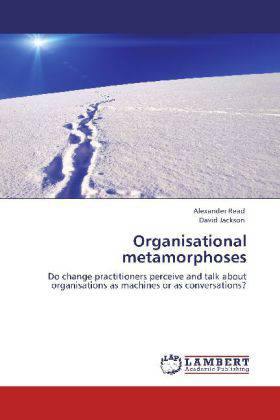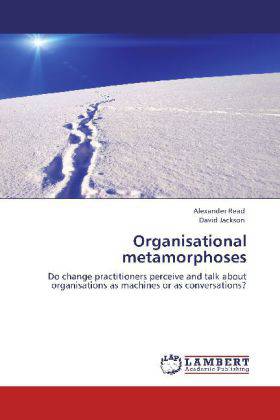
- Afhalen na 1 uur in een winkel met voorraad
- Gratis thuislevering in België vanaf € 30
- Ruim aanbod met 7 miljoen producten
- Afhalen na 1 uur in een winkel met voorraad
- Gratis thuislevering in België vanaf € 30
- Ruim aanbod met 7 miljoen producten
Zoeken
Organisational metamorphoses
Do change practitioners perceive and talk about organisations as machines or as conversations?
Alexander Read, David Jackson
Paperback | Engels
€ 74,45
+ 148 punten
Omschrijving
Most managers, change practitioners, consultancies, University programmes, and more, are talking about organisational life and change management from a rational, simplistic, mechanical, objective, and systems thinking perspective, where little room is paid to the micro details of human interaction and how people come to do what they do in their everyday accomplishments. It is argued that this organisations as machines view, with all its theories, models, prescriptions, techniques, and ways of talking about change management, has provided little help in order to successfully change organisations, with a failure rate of up to 90 percent. Therefore, it is not a need for more complex tools, and models for change practitioners to follow, rather what is called for is a new way of making sense and thinking about our daily activities and what happens in the interplay between people. This view is reflected by the theory of complex responsive processes of relating, and is labelled organisations as conversations . The authors of this book set out to investigate if change practitioners in a public company in Norway embraces complexity thinking or the "organisations as machines" view.
Specificaties
Betrokkenen
- Auteur(s):
- Uitgeverij:
Inhoud
- Aantal bladzijden:
- 140
- Taal:
- Engels
Eigenschappen
- Productcode (EAN):
- 9783659129605
- Verschijningsdatum:
- 23/05/2012
- Uitvoering:
- Paperback
- Afmetingen:
- 152 mm x 220 mm
- Gewicht:
- 213 g

Alleen bij Standaard Boekhandel
+ 148 punten op je klantenkaart van Standaard Boekhandel
Beoordelingen
We publiceren alleen reviews die voldoen aan de voorwaarden voor reviews. Bekijk onze voorwaarden voor reviews.







